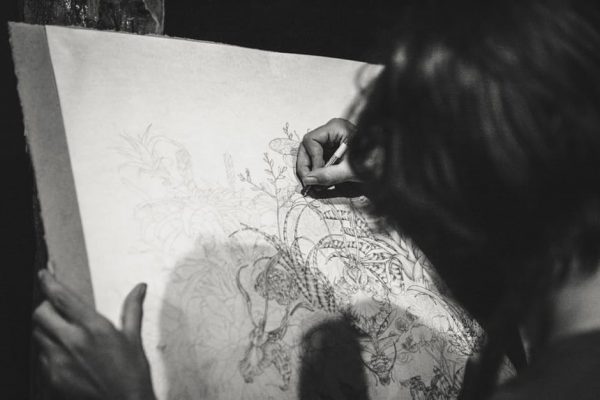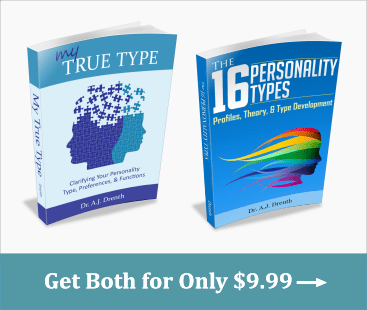
Introverts don’t want just any job or career. They want to do something they love, something they are passionate about. They want to do what “they were born to do,” to use their creative gifts and abilities in ways that bring personal fulfillment and contribute to the collective good. I touched on this in my book, My True Type:
Especially in the first half of life, Introverts are most interested in discovering exactly what it is they have to offer the world. They see self-knowledge as a prerequisite to authentic action. Without an adequate map of themselves, they feel lost and aimless. For them, external circumstances are far less important than self-understanding and self-direction. Once they have a sense of who they are and what they should be doing, they feel they can be happy anywhere.
As you may already know, Introverts can be grouped into more specific personality types. According to the Myers-Briggs, there are eight Introverted types. In our careers section, you can find pages exploring specific jobs and careers best-suited for each of the personality types.
In this post, we will explore the value of creative jobs and careers for Introverts, especially for Intuitive Introverts (i.e., INFP, INTP, INFJ, INTJ types). We will also consider common challenges associated with cultivating creative careers, as well as recommendations for fostering creative achievement.
The Value of Creative Careers for Introverts
“Vocation acts like a law of God from which there is no escape…He must obey his own law…Anyone with a vocation hears the voice of the inner man; he is called.” -Carl Jung
There are a host of reasons why creative careers are important and healthy for the Introvert. In addition to sheer enjoyment, Introverts cherish creative expression for its role in deepening their self-knowledge. Creative work can provide them with a clearer sense of identity and play an important role in their personal development. In his book, Solitude, Anthony Storr writes, “The creative person is constantly seeking to discover himself [sic], to remodel his own identity, and to find meaning in the universe by means of what he creates.” Don Riso and Russ Hudson, established authorities on the Enneagram and authors of Personality Type, suggest that creative work allows individuals to “harness their emotions without getting lost in them, not only producing something beautiful but discovering who they are. In the moment of inspiration, they are, paradoxically, both most themselves and most liberated from themselves.”
Creative careers also grant Introverts the opportunity to share their inner world with others. D.W. Winnicott writes, “Part of the satisfaction which a creative person obtains from his achievement may be the feeling that, at last, some part of his inner life is being accepted which has never been accorded recognition before.”
Finally, creative work can confer a variety of psychological benefits. It can serve as an effective outlet for deep-seated emotions, anxieties, and past hurts. As an INFP acquaintance once confessed to me, “When my anxiety starts to get the best of me, I have no choice but to paint.” Paula Olszewski-Kubilius takes things a step further and suggests that “creative producers…fulfill motives acquired in childhood—for love, independence, or domination.” Clearly, there a number of reasons for Introverts to do all they can to discover and capitalize on opportunities for creative work.
Challenges of Creative Jobs & Careers
Research in the field of lifespan development has demonstrated that “career consolidation” is an important part of human development. According to Harvard’s George Vaillant, career consolidation consists of four primary components: commitment, competence, contentment, and compensation. The issue of compensation is perhaps the most difficult for Intuitive Introverts to navigate. While Sensing types tend to be oriented to concrete actions and products, Intuitive Introverts are drawn to more creative, abstract, and often unconventional sorts of work. And since roughly three-quarters of the general population is constituted by Sensing types, some Intuitives must come to terms with the fact that the market for their work is limited to a relatively small or specific niche.
This is not to say that there are no opportunities for monetizing their work. Historically, Intuitive Introverts have earned a living as priests, Shamans, teachers, sages, lawyers, and other knowledge / wisdom-oriented roles. With the advent of modern science and universities, further opportunities were spawned. And while artists have historically encountered greater difficulty in finding compensation for their work, the recent advent of the Internet as well as various artistic industries (music, movies, publishing, etc.) has expanded opportunities and exposure for artists of all sorts. Although competition can be fierce, the Internet makes showcasing one’s work easier than it has ever been. This can serve as a huge plus for Introverts hoping to convert their chosen art into a viable career.
In his book, What Should I Do with My Life?, Po Bronson cites a number of potential challenges for those pursuing creative careers. One involves the common belief that a creative career cannot commence until one has all the answers and has everything neatly aligned. This seems particularly relevant to Introverts, who often feel they must completely know themselves and their life’s purpose before they can act.
Another potential obstacle is fear of social repercussions. Without sufficient external support, Introverts may feel alone and isolated in their pursuits, leading to feelings of doubt and uncertainty. They may wonder if anyone will ever understand them, consider them valuable, or grasp the true meaning of their work.
Introverts may also struggle with fears of failure. Such fears can manifest as excuses or justifications for inaction, as well as through a constant shifting of interests that makes it all but impossible to accomplish anything of lasting worth. In other cases, they may not fear failure so much as mediocrity. Because of their idealism, they may feel that if they cannot be “the best” at something then it is not worth doing.
Introverts may also sell themselves short when it comes evaluating their own abilities. While often gifted and talented, many judge themselves too quickly and harshly, truncating opportunities to actualize their potential. I know a couple of individuals, for instance, who did not begin painting until midlife, only to discover that they had amazing artistic talents. It was not a matter of their not possessing such abilities earlier in life, but the fact they were never explored or developed.
Closely related to fears of failure or mediocrity is the issue of self-doubt. Philosopher and psychologist William James serves as a useful study for doubting creative types. James was a profoundly gifted individual who for many years struggled with debilitating self-doubt and indecision. Like many Introverts, he not only harbored a host of doubts toward himself, but also about his rightful place in the world.
General Recommendations for Creative Achievement
What follows are some general recommendations for Introverts who are serious about pursuing a life of creative work. Even if you start with only one or two them, they can help you build momentum and develop a sense of purposeful direction.
1. Know and understand your personality type.
Realizing that you are an Introvert is undoubtedly an important step in your life’s journey. It can tell you a lot about who you are and what your strengths are. But there is much more to your personality than your introversion. It is also critical to know your S-N, T-F, and J-P preferences, as well as the specific functions that make up your personality type. To identify or clarify your type, I recommend you take advantage of our personality test and books.
2. Develop effective habits.
One of William James’s key discoveries was the importance of gradually building confidence and self-discipline through a series of small volitional acts. Through this sort of “baby steps” approach, James learned to build his self-confidence from the ground up, a process he dubbed the “education of the will.” Included in this process was the development of effective habits: “Only when habits of order are formed can we advance to really interesting fields of action.” Habits proved pivotal in James’s cultivation of a more meaningful and satisfying life. In his memoir, On Writing: A Memoir of the Craft, Stephen King advocates something similar, stating that he rarely takes a day off from writing, not even on holidays. In King’s view, if you are passionate about something, it must be pursued fiercely and resolutely. So try to set aside a block of time each day to devote to your discovering or pursuing your passion. You may wish to experiment with different times of day to determine when you are most focused, inspired, and clearheaded. Remember, one needs to spend significant time in a niche to attain the prerequisite level of skill and understanding for creative accomplishment; ten years is often cited as a ballpark figure for expertise.
3. Challenge your excuses.
The longer I live and challenge myself, the more I discover my excuses and perceived limitations to be faulty. Stop telling yourself, for instance, that there is not enough time to engage your passion.
4. Conduct a life study.
Where is the majority of your time and energy spent each day? What things are keeping you from more fully engaging your passion? Are you unnecessarily concerning yourself with trivial tasks or worries? Are you working too many hours, leaving little time to pursue your creative interests.
5. Don’t sell yourself short.
Many Introverts struggle to believe in themselves and commonly report feeling like a fraud or impostor. They severely underestimate their abilities and prematurely conclude they are incapable of success in certain vocations. Since they are often questionable assessors of their potential, it is sometimes better for Introverts to give things a serious attempt anyway. It wasn’t until my mid-twenties that I first started taking writing seriously. I clearly remember how arduous it seemed to generate a single page of text. It was only after spending many years engrossed in reading, writing, and study that writing seemed to come more effortlessly.
6. Networking / mentoring.
It can be easy for individualistic Introverts to isolate themselves and believe they can accomplish things on their own. Unfortunately, in doing so, they close themselves off to the numerous potential benefits of engaging with like-minded others.
Learn More:
To learn more about Introverted personality types, be sure to explore our books:
My True Type: Clarifying Your Personality Type, Preferences & Functions
The 16 Personality Types: Profiles, Theory & Type Development

Cassie says
I am just astonished by how much I actually could relate to your studies… I love this article, and I plan to read every single book of yours. Everything I read I could directly relate to, it was genius, I can’t wait to discover more of your work. This has also helped me find an actual enjoyable career for my kind of “introvert” personality… I plan to share your incredible studies with a few friends of mine. Thank you so much!
Roana says
Everything you wrote I was able to identify with! Now if only I could just identify my career…. its difficult when money is such a dire need…
Jessica says
“Intuitive introverts may also struggle with fears of failure.”
I struggle with this on a daily basis and I don’t know why. I fear failure, but I should view it as a learning opportunity. I fear rejection, but at the same time I don’t want to care what people think. It’s a vicious cycle.
I sway between INFJ & INTJ (depending on my stress level) and need to find a career that fits my personality and also pays the bills, since I’m a single mother of two.
Long story short, I appreciate your article. Thank you.